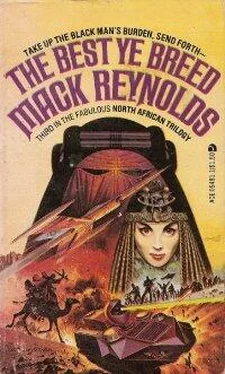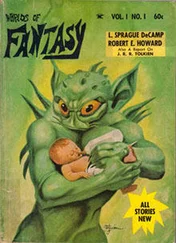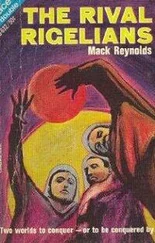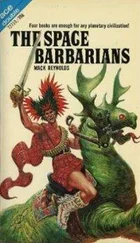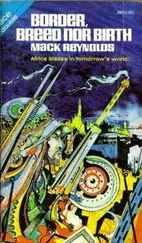Mack Reynolds - The Best Ye Breed
Здесь есть возможность читать онлайн «Mack Reynolds - The Best Ye Breed» весь текст электронной книги совершенно бесплатно (целиком полную версию без сокращений). В некоторых случаях можно слушать аудио, скачать через торрент в формате fb2 и присутствует краткое содержание. Год выпуска: 1978, ISBN: 1978, Издательство: Ace Books, Жанр: Фантастика и фэнтези, на английском языке. Описание произведения, (предисловие) а так же отзывы посетителей доступны на портале библиотеки ЛибКат.
- Название:The Best Ye Breed
- Автор:
- Издательство:Ace Books
- Жанр:
- Год:1978
- ISBN:0-441-05481-1
- Рейтинг книги:4 / 5. Голосов: 1
-
Избранное:Добавить в избранное
- Отзывы:
-
Ваша оценка:
- 80
- 1
- 2
- 3
- 4
- 5
The Best Ye Breed: краткое содержание, описание и аннотация
Предлагаем к чтению аннотацию, описание, краткое содержание или предисловие (зависит от того, что написал сам автор книги «The Best Ye Breed»). Если вы не нашли необходимую информацию о книге — напишите в комментариях, мы постараемся отыскать её.
The Best Ye Breed — читать онлайн бесплатно полную книгу (весь текст) целиком
Ниже представлен текст книги, разбитый по страницам. Система сохранения места последней прочитанной страницы, позволяет с удобством читать онлайн бесплатно книгу «The Best Ye Breed», без необходимости каждый раз заново искать на чём Вы остановились. Поставьте закладку, и сможете в любой момент перейти на страницу, на которой закончили чтение.
Интервал:
Закладка:
The prince came to his feet.
He said, “You will leave immediately for North Africa and find the answers to the questions we ask about El Hassan and his follower Bey-ag-Akhamouk and their effect upon our future. You will report directly to me and take no overt action, no matter what the provocation, until we have passed upon it.”
The colonel also stood and bowed his acceptance. “Your Highness,” he said.
IV
SERGE SVERDLOV
Colonel Serge Sverdlov was retracing a route he had covered so often that he didn’t bother to watch the passing scene as his automated hover limousine took him past St. Basil’s Cathedral, on one side of Red Square, to cross the Moscow River by the Moskvoretski Bridge and into the traffic of Pyatnikskaya. The car turned west at Dobryninskaya Square to Gorgi Park. It ran along that on Kaluga until it pulled up before the aged Czarist baroque palace, once belonging to the Yusopov family, the scion of which had assassinated the mad monk Rasputin, but which now housed Sverdlov’s branch of the ministry.
He had sometimes wondered why the organization of which he was a part had never moved to more spacious and certainly more modern quarters. It was, from his viewpoint, by far the most important, most powerful, and most feared ministry of the Soviet Complex.
It had a lengthy history. In its beginnings under Lenin, it had been known as the Cheka, which took its name from Chrezvychainaya Kossmissiya ; its full title being Extraordinary Commission for Combating Counter-Revolution, Sabotage and Speculation. It had been abolished in 1922 to make way for an organization still more famous, the GPU, standing for Gosudarstvennoye Politicheskoye Upravleniye , or State Political Administration. Stalin decided ten years later in 1934 to do away with the OGPU and reorganized it under the name of NKVD or People’s Commissariat of Internal Affairs. Twelve years later, it was replaced by the MVD, the Ministry of Internal Affairs. Still later, the organization split into internal and foreign branches and the KGB, Sverdlov’s organization, the Committee of State Security, became the secret police, particularly involved in counter-espionage, espionage and security. It fulfilled much the same functions as the Central Intelligence Agency of the United States in gathering and evaluating information but also had police powers similar to those of the FBI.
Yes, it was to this branch of the Soviet Complex’s government that Serge Sverdlov devoted his services. He was a mediumly built man but more than ordinarily lithe; the slight slant of eyes, the darkness of complexion, give suspicion of his Cossack heritage. His teeth were white, perfectly so, and his smile good—when he smiled. But there was something about his eyes. The story was in international espionage circles that he had killed more men than cholera. He had worked abroad on enough assignments that he had picked up taste in clothing and was attired more nearly as a London clubman than a Moscow gumshoe.
He left the hover limousine and strode toward the elaborate entrada of the Yusopov palace. There were no flags above it, no signs nor anything else to indicate that the present nature of the pre-revolutionary building was what it was, save the two uniformed guards in front. They snapped to the salute upon his approach but since he was in mufti he ignored them and passed on into the building.
There were two more guards there, but Colonel Sverdlov was well known and he ignored them and went on.
He was thoroughly familiar with the building and, as he had often before, wondered that anyone, even a Czarist prince, would choose to live in such sterile surroundings. He strode along marble halls. All about were a profusion of alleged art objects which went back to the old days, paintings, statuary, furniture. No one, down through the decades since the revolution, had ever bothered to move them. The tastes of the Czarist aristocracy had been abominable.
The colonel reached the heavy doors of the office to which he was bound and the lieutenant at the desk there looked up, at first impatiently, but that expression was immediately wiped from his face.
“Yes, Comrade Colonel,” he said snappily.
Sverdlov said, “I believe that the Minister is expecting me.”
“Yes, Comrade Colonel. His orders are that you be admitted immediately.”
The colonel opened the door and passed through.
The office beyond was large but not ostentatious. The Minister was of the old school and had actually first joined the organization as a youth when Beria was still in his final days and Stalin in full power. He affected simplicity, despite his rank. The fact that he still held his position was testimony to his ability to roll with the blows.
Minister Kliment Blagonravov was already looking at the door at Colonel Sverdlov’s entry. He was a heavy man, heavy of face and heavy-set. His head was shaven, though that old style of the Party’s military men and upper-echelons of police officials had all but disappeared. His simple jacket of the type once de rigueur in the times of Lenin and the Old Bolsheviks, now an affectation, was hung over the back of a chair and his collar had been unbuttoned, but he was still sweating. Not for Kliment Blagonravov the effeminacy of air-conditioning.
He projected a camaraderie with his more trusted agents, and said now, in supposed heartiness, “Serge! We see too little of you these days!”
The KGB agent was fully aware of the iron beneath the lard of his ultimate superior. He said ruefully, “I see too little of Moscow, Comrade Blagonravov. No matter how dedicated, one misses home.”
“Yes, yes, of course. It is a shame that Party duties keep you abroad so much, Serge. You are too confounded efficient. Sit down, sit down.” The bureaucrat swung in his chair so that he could reach the bar set into the wall behind him. As the colonel found a chair, he opened the door of the refrigerator compartment and came forth with a bottle, slightly yellowish in color of contents. He plucked two three-ounce glasses from the bar’s top and swiveled back to his desk.
“As I recall, Serge, your favorite is Zubrovka vodka. A sprig of that particular Polish grass to flavor it. Personally, I prefer Stolitschnaja but I shall join you.” He poured the glasses full and pushed one of them over to his subordinate.
Sverdlov nodded his thanks, even as he took up the glass. It was proverbial that no matter what the hour, one did not get through Blagonravov’s office without emerging with at least a slight glow on. Woe betide the teetotaler summoned into the Minister’s presence.
“It’s been a long time,” the colonel said, holding the glass up in toast. “The drink in Indonesia is atrocious, particularly what they are pleased to call vodka. It comes from Japan, so I understand, and is probably made from rice.”
“The world revolution!” the minister said, holding his own chilled spirits up.
“The revolution,” the colonel said, repeating the standard formula.
They knocked back the vodka in stiff-wristed motion.
“And how go things in Indonesia?” Blagonravov rumbled.
His operative shrugged. “It is unbelievably corrupt, Comrade. At all levels. The worker in the street would become a communist for one cigarette. For two, he would become a Christian, and for three he would slit your throat.”
The other growled, “I understsnd that the corruption applies even to ranking members of the local party.”
Sverdlov cleared his throat. “Yes,” he said. “Even petty graft. No one seems free of it.”
The minister sighed his disgust. “How can one sponsor revolution with such elements? But enough of Indonesia.” He refilled the glasses.
The colonel looked at him to go on, attentively.
Читать дальшеИнтервал:
Закладка:
Похожие книги на «The Best Ye Breed»
Представляем Вашему вниманию похожие книги на «The Best Ye Breed» списком для выбора. Мы отобрали схожую по названию и смыслу литературу в надежде предоставить читателям больше вариантов отыскать новые, интересные, ещё непрочитанные произведения.
Обсуждение, отзывы о книге «The Best Ye Breed» и просто собственные мнения читателей. Оставьте ваши комментарии, напишите, что Вы думаете о произведении, его смысле или главных героях. Укажите что конкретно понравилось, а что нет, и почему Вы так считаете.
